#What is AFSPA?
Explore tagged Tumblr posts
Text

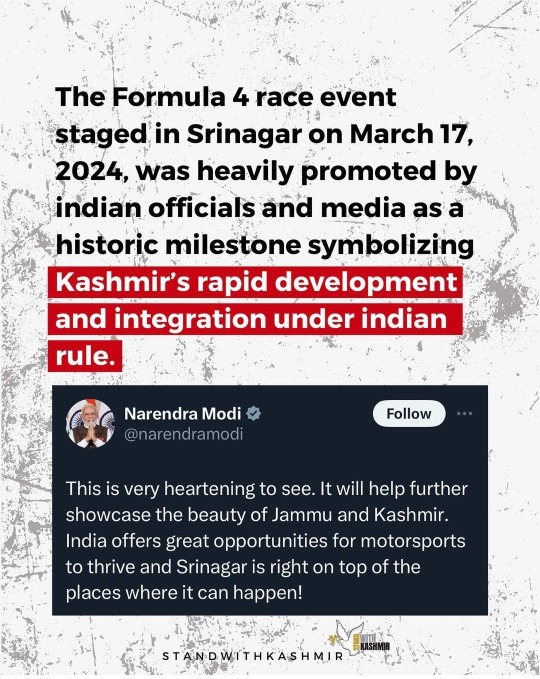
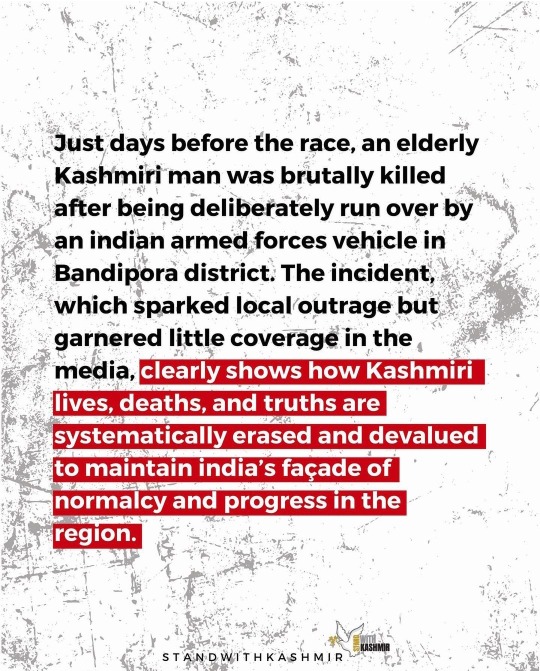
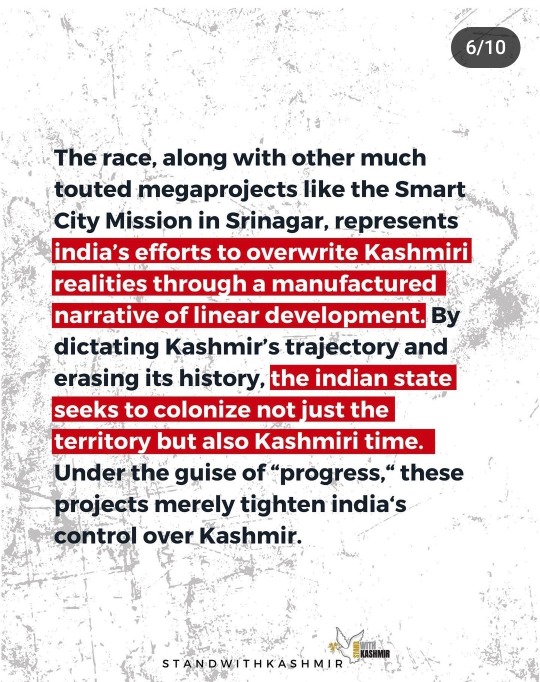

@/standwithkashmir2 on insta
#f1#not really but yeah#skipped a few slides too tired to ss them all the point remains the same#like trying to get a track in gift city aka their 'corp hub#(it looks like fake singapore plus fake dubai. and I've never been to either place yet it's so obvious 💀)#quite close to elections as well ...#what you have to know is the current govt tried to show progress through 'industrialisation'#nevermind that they illegally made the state into union territories....nvm the large military presence or afspa....#look how easy it is to be a tourist now :)
3 notes
·
View notes
Text
Partition’s Poison: How Empire Bled Kashmir
Kashmir has been under military occupation for over seventy years. What happens there is not a border dispute. It is not a clash of cultures. It is not about development or security. It is colonialism. It is occupation. It is the violent subjugation of an entire people by a state that rules them without their consent. The Indian state has killed, tortured, disappeared, raped, maimed, blinded, and silenced Kashmiris in the name of national unity. It has bombed their homes, desecrated their graveyards, and turned their valleys into open-air prisons. It has done all this under the cover of democracy and legality. It has told the world this is internal. It is not. It is imperial violence. It is state terror. It is genocide in slow motion. And it began the moment the Indian flag was planted on their soil.
When British India was partitioned in 1947, over 560 princely states were given the choice to join India or Pakistan. Kashmir was ruled by a Hindu king, Maharaja Hari Singh, but its population was overwhelmingly Muslim. The people wanted to join Pakistan or become independent. The king stalled. In October 1947, armed tribesmen from Pakistan entered Kashmir. The king panicked and fled. He signed the Instrument of Accession with India. Indian troops landed the next day. The people were never asked. They never voted. There was no referendum. From that moment, Kashmir became a colony of India.
The Indian military has never left. Its presence grew every decade. Today there are between 600,000 and 900,000 Indian soldiers and paramilitaries in the valley. That is the highest military density anywhere on Earth. Every town is surrounded. Every road has checkpoints. Every school, mosque, hospital, and newspaper is monitored. Surveillance drones fly overhead. Journalists are jailed for calling it what it is. Children are interrogated. Women are harassed. Dissent is crushed.
In 1948, India took the issue to the United Nations. The UN passed Resolution 47, which called for a plebiscite so the people of Kashmir could decide their future. India agreed in public, but sabotaged it in practice. It delayed. It made excuses. It rigged elections. It installed puppet leaders. It signed new agreements without Kashmiri consent. It passed laws that gave soldiers immunity from prosecution. In 1953, India arrested the Prime Minister of Kashmir, Sheikh Abdullah, and jailed him for over a decade because he demanded autonomy. The message was clear. India would rule Kashmir by force.
Resistance began in waves. In the 1960s and 70s, it was political. It was nonviolent. India responded with bullets and censorship. In 1987, Kashmiris participated in elections hoping for change. The vote was rigged. Candidates were jailed. Protesters were shot. After that, armed rebellion broke out. Young men picked up weapons. Some trained in Pakistan. Most were local boys. The response from the Indian state was mass murder.
By the early 1990s, Indian forces were killing with impunity. Villages were burned. Men were lined up and executed. Women were raped in front of their families. In 1991, in the village of Kunan Poshpora, Indian soldiers raped at least 40 women in a single night. They tied up the men, looted homes, and went door to door. Survivors were ignored. Medical reports were buried. No one was punished.
Thousands of young men were picked up by soldiers and never returned. These are the disappeared. The government denies it. But there are over 7000 unmarked graves scattered across Kashmir. In some graves, the bodies are mutilated. In others, the skulls are fractured. Mothers wait decades for answers. They protest every week. They hold up photos of their sons. The army walks past them in silence.
Indian soldiers operate with total legal immunity under the Armed Forces Special Powers Act (AFSPA), a colonial law that allows them to arrest without warrant, shoot on suspicion, and occupy any property. AFSPA has turned Kashmir into a war zone. It has protected rapists. It has protected executioners. It has protected torturers. Soldiers tie civilians to jeeps and use them as human shields. They shoot pellet guns at teenagers and blind them permanently. Over 1000 people have lost their eyesight. The youngest victim was 19 months old.
In 2010, mass protests erupted after Indian police murdered three teenagers. The army fired into crowds with live ammunition. Over 120 civilians were killed in three months. Most were teenagers. Some were children. The state called them terrorists. Their funerals were banned. Families were raided. Phones were tapped. Schools were shut. Entire towns were locked down for weeks.
In 2016, 22-year-old militant Burhan Wani was killed by Indian troops. He had become a symbol for resistance. When news of his death spread, over 100,000 people marched at his funeral. India responded with bullets and pellets. In the next few months, they injured over 15,000 people. They broke into hospitals and beat doctors. They raided ambulances. They arrested children as young as eight. They denied oxygen to hospitals during curfews.
In 2019, India revoked Article 370 of its own constitution, stripping Kashmir of its limited autonomy. It passed the decision without consulting a single Kashmiri. It cut all communication. Phones, internet, and TV were shut down for months. Thousands were arrested, including former ministers, journalists, students, and even children. The army took over schools and broadcast nationalist propaganda. New laws were passed to allow Indian citizens to buy land in Kashmir. Settler colonialism was formalized. The demographic war had begun.
Since then, India has intensified its grip. It labels every form of resistance as terrorism. It jails writers for tweeting. It shuts down newspapers. It censors textbooks. It rewards soldiers for extrajudicial killings. It bulldozes homes of protesters. It raids mosques during Ramadan. It bans flags, songs, poems, and funerals. It invades the dead. It erases grave markers. It turns martyrs into numbers. Into unnamed corpses in state morgues.
And the world looks away. Western governments praise India as the world’s largest democracy. They sell it weapons. They sign trade deals. They ignore the rapes, the disappearances, the torture, the occupation. Indian media, owned by billionaires, spews Islamophobia daily. It mocks the pain of Kashmiris. It demands more blood. It glorifies soldiers as heroes. It laughs at blind children. It calls their fathers traitors.
Kashmir is not under dispute. It is under siege. Its people are not confused. They are resisting. They are resisting the army, the surveillance, the humiliation, the erasure. They are resisting the theft of their land and the denial of their identity. They are resisting genocide. And they have resisted for more than seven decades.
India has not won. It has not pacified the valley. It has only turned it into a graveyard of martyrs. A place where memory is a weapon. Where every family carries a list of the dead. Where every child knows the name of the soldier who killed their brother. This is not normal. This is not peace. This is occupation. And it will never be forgiven.
#jammu and kashmir#politics#american politics#hindutva#pakistan#india#south asia#kashmir#free kashmir#free palestine#idf#october 7#palestinians#israel#hamas#usa politics#anarcho communism#anti communism#free gaza#gaza strip#gaza#gaza genocide#gazaunderattack#palestine#colonialism#colonial era#colonial history#colonial america#indiablr#india pakistan war
21 notes
·
View notes
Note
In which world has India "occupied" Kashmir? Kashmir is a part of India which is severely affected by terrorist activity. Many were forced to leave their homes to settle in different parts of India (Kashmir pandits etc). How was that India's fault and not the fault of the country the terrorists came from?
Firstly, I want to make it clear that I do condemn what was done to Kashmiri Pandits. Secondly, I do believe that Kashmir is occupied (that does NOT mean that I don't understand that the geopolitical reality is complex), and that a plebiscite should have been conducted. And I believe that neither India nor Pakistan has been entirely innocent with regard to Kashmir.
My interpretation of the events described below (quoted from the linked articles), is that Kashmir is occupied. And no, they are not my only sources of information - other articles, the Kashmiri woman who came to speak at my university, and a friend of a friend who visited Kashmir and stayed there for a significant period of time (not as a tourist), are also sources of my information on Kashmir.
When India and Pakistan gained independence from British rule in 1947, the various princely rulers were able to choose which state to join. The Maharaja of Kashmir, Hari Singh, was the Hindu head of a majority Muslim state sandwiched between the two countries and could not decide. He signed an interim "standstill" agreement to maintain transport and other services with Pakistan. In October 1947 tribesmen from Pakistan invaded Kashmir, spurred by reports of attacks on Muslims and frustrated by Hari Singh's delaying tactics. The Maharaja asked for Indian military assistance. India's governor-general, Lord Mountbatten, believed peace would best be served by Kashmir's joining India on a temporary basis, pending a vote on its ultimate status. Hari Singh signed the Instrument of Accession that month, ceding control over foreign and defence policy to India. Indian troops took two-thirds of the territory, and Pakistan seized the northern remainder. China occupied eastern parts of the state in the 1950s. Whether the Instrument of Accession or the entry of Indian troops came first remains a major source of dispute between India and Pakistan. India insists that Hari Singh signed first, thereby legitimising the presence of their troops. Pakistan is adamant that the Maharaja could not have signed before the troops arrived, and that he and India had therefore ignored the "standstill" agreement with Pakistan. Pakistan demands a referendum to decide the status of Kashmir, while Delhi argues that, by voting in successive Indian state and national elections, Kashmiris have confirmed their accession to India. Pakistan cites numerous UN resolutions in favour of a UN-run referendum, while India says the Simla Agreement of 1972 binds the two countries to solve the problem on a state-to-state basis. There has been no significant movement from these positions in decades. In addition, some Kashmiris seek a third option - independence - which neither India nor Pakistan is prepared to contemplate.
The two countries fought wars over Kashmir in 1947-48 and 1965. They formalised the original ceasefire line as the Line of Control in the Simla Agreement, but this did not prevent further clashes in 1999 on the Siachen Glacier, which is beyond the Line of Control. India and Pakistan came close to war again in 2002. The situation was further complicated by an Islamist-led insurgency that broke out in 1989. India gave the army additional authority to end the insurgency under the controversial Armed Forces Special Powers Act (AFSPA). Despite occasional reviews of the AFSPA, it still remains in force in Indian-administered Jammu and Kashmir.
Today it remains one of the most militarised zones in the world. China administers parts of the territory.
Media in Indian-administered Kashmir are generally split between pro- and anti-secessionist. Local journalists work under strict curfews and also face threats from militant groups. Internet access is sporadic and text messaging services are regularly blocked.
In Pakistani-controlled Kashmir, the media are used mainly for propaganda purposes, mainly to highlight the alleged human rights violations in Indian-administered Kashmir.
Also, I think the following information is relevant too.
The Muslim majority in the princely state found the Maharaja’s reign authoritarian. In the words of Kashmiri author P.N. Bazaz, “Dogra rule has been a Hindu Raj.” Maharaja Hari Singh thought of independence because, according to American Indologist William Norman Brown, “He disliked becoming part of India, which was being democratised, or Pakistan, which was Muslim....”
On August 12, 1947, J&K petitioned India and Pakistan for a standstill agreement, which Pakistan signed but India refused, asking the Maharaja to send a representative for discussions. With every passing day, the Maharaja’s position became more precarious. As early as June 1947, about 60,000 ex-army men (mostly from Poonch) had started a no-tax campaign against the Maharaja. On August 14-15, Muslims in Poonch hoisted Pakistani flags, provoking the imposition of martial law and further angering Muslim subjects. Pakistan was sending warning notes to the Maharaja, one on August 24 reading: “Should Kashmir fail to join Pakistan, the gravest possible trouble will inevitably ensue.” The worst fears of the Dogra ruler came true when on October 22, Pakistan launched Operation Gulmarg by mobilising tribals from the North-West Frontier Province. About 2,000 tribesmen, armed with modern weaponry, raided Muzaffarabad. By the evening of October 23 they had captured Domel. Garhi and Chinari fell over the next two days. Then their main column proceeded towards Uri, and then, along the Jhelum river towards Baramulla, the entry point to Srinagar.
On October 24, Maharaja Hari Singh appealed to India for military aid to flush out the raiders. India obliged but not before the Instrument of Accession was signed on October 26. It limited India’s powers over the Valley to matters of defence, communications, and foreign affairs.
And this is from the Instrument of Accession:
Nothing in this Instrument shall be deemed to commit in any way to acceptance of any future constitution of India or to fetter my discretion to enter into agreement with the Government of India under any such future constitution.
4 notes
·
View notes
Text
exactly!! its weird as fuck to be referring to a place as "switzerland" or "heaven" . what else is entitlement if you feel liek its okay to take a vacation there while ignoring the social realities? so many gross human rights abuses have happened under the AFSPA act.
and this absolutely IS the natural consequence of fetishising kashmir as some kind of paradise on earth or hindu spiritual homeland when an indian tourist's presence is quite literally built on colonial entitlement and arrogance
387 notes
·
View notes
Link
What is AFSPA Full Form? AFSPA का मतलब क्या होता है? जाने AFSPA के बारे में….
0 notes
Text
"Unveiling the Secret: Government Extends Controversial AFSPA in Arunachal and Nagaland! What Hidden Truths Lie Behind This Six-Month Extension?"
The Armed Forces (Special Powers) Act, which designates certain areas as “disturbed” to aid security forces, has been extended in parts of Arunachal Pradesh and Nagaland. Under this act, armed forces personnel have extensive powers to search, arrest, and use force if necessary for maintaining public order in these areas. The AFSPA has been in effect in select districts and police stations in both…
View On WordPress
0 notes
Text

I have no idea what the revocation of articles 370 and 35-A will mean. But I am uncomfortable and scared. There can be no forced integration and true integration cannot happen without justice.
Are the thousands of human rights complaints in Kashmir finally going to be investigated?
Will the perpetrators of Kunan Pushpora be booked for their crimes?
Will AFSPA be removed ?
Will the half-widows of J&K finally know what became of their husbands?
Will the young people of Kashmir be treated like our own or will every incident like Pulwama trigger violence against them like it happened in February?
These are the difficult questions. Do they have answers?
90 notes
·
View notes
Text
A Malayalee Hindu’s Confession on Citizenship Bill
The Citizenship Amendment Bill is now law. Many of my colleagues on twitter say they feel sad, scared, angry, disappointed. I feel no such emotion.
And why should I? It doesn’t affect me. I am a Hindu. I don't know why Muslims are upset. They are not losing citizenship or anything.
And these protests in the Northeast! To be honest, where is the Northeast? It seems somewhere back of the beyond. I have never been there. I don’t see the region becoming a job hub in the foreseeable future. If and when I go, it will be as a tourist. I will click a few photos to keep at home, a reminder of a good trip.
To be honest I don’t know how many states are there in the Northeast. That would be an exaggeration, there are Seven Sisters. Is Sikkim one of the sisters or a distant cousin or neither? I don’t know.
I learnt the capitals of the seven states to score marks in GK. That done, I readily forgot them the moment I passed out.
I mean who cares about the Northeast? If it wasn’t for the blank cheque, err passport, for illegal Hindu immigrants and a babaji ka thullu, isn’t that what Kapil Sharma says, for illegal Muslim immigrants, we wouldn’t be wasting any airtime or ink on the Northeast.
You don’t believe me?
Manipur was blockaded for nearly 5 months - that is almost half the year - a couple of years ago. Did anyone notice it? Did anyone cover the news?
Irom Sharmila, a resident of Manipur, was on a hunger strike for 16 years demanding removal of AFSPA. Hardly anyone noticed. AFSPA is still in force in Manipur. Irom just gave up her fight and got married. Her wedding made more headlines than the fast. BTW, she also lost an election somewhere in between. It would be wrong to say nothing fruitful came out of Irom’s hunger strike. A few people wrote her biographies and she got the title ‘Iron Lady’.
This is how much we Indians care for the Northeast.
I don’t know much about CAB, but what I know is it was in the BJP’s manifesto and the party swept the Northeast. It means the people of the region want the law, right? I may be wrong, but I have already admitted I give a damn about the place.
That is not to say I am a heartless soul. I have deep affection for people and things Northeastern. Just like I relish Hyderabadi biryani and mutton kababs, I like momos and red chutney. They are good touchings for rum. Not to speak of the people. They make for wonderful drinking buddies.
Now you know why I don’t feel sad, scared, angry or disappointed over the citizenship bill.
Prime Minister Narendra Modi has mastered one trick. Us versus them. And this ‘us’ is always a lot more significant in numbers than the ‘them’.
At some point, the party’s gaze will turn to Kerala. It fits the bill. Small state. Sizeable Muslim population. Just 20 Lok Sabha seats which the party anyway doesn’t win. It could come in the form of a countrywide beef ban for example. Us versus them.
That is when I will feel sad, scared, angry, disappointed.
9 notes
·
View notes
Text

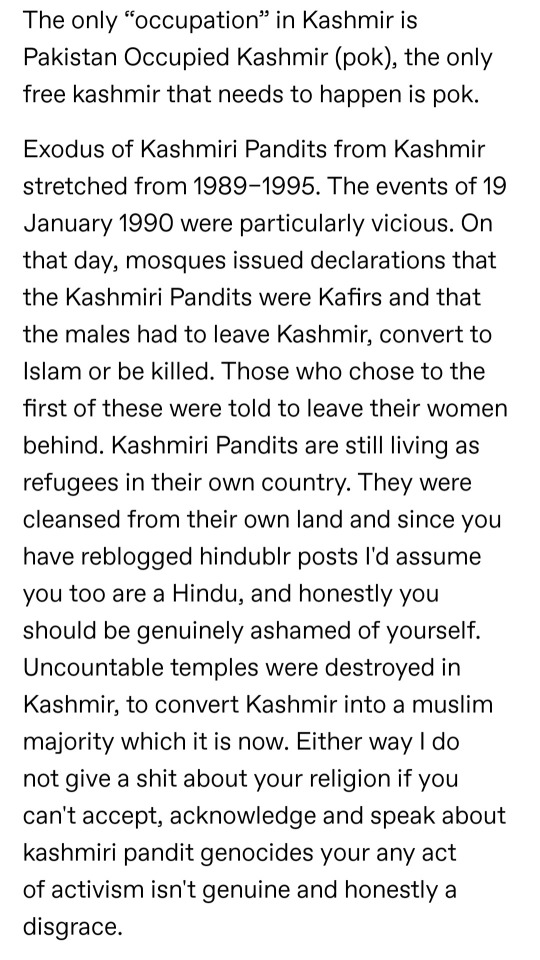
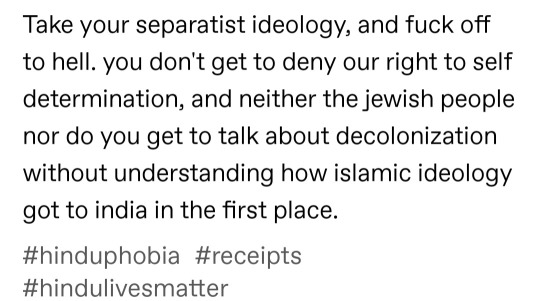
How is it Hinduphobia to acknowledge that Kashmir is being controlled in an unjust way? Criticizing a leader who is Hindu, is not Hinduphobia. I do acknowledge the wrongs that were done to Kashmiri Pandits, and I condemn those wrongs. They have a right to self-determination. That does not mean India gets to impose itself on Kashmir. I'm not here to say what Kashmiris (of any religion) should or shouldn't do, they should be allowed to decide for themselves whether they want to be independent or join India or join Pakistan. Yes, I know that Sec 370 was meant to be temporary. But a plebiscite was also meant to be conducted, and that never happened. It's not just Al Jazeera or social media posts that have questioned the ethics of removing Kashmir's special status, considering its historical and legal context. Also, even if none of this had happened, and Kashmir never had special status, separatist ideology is not inherently morally wrong. Nationalism is also not inherently wrong. But actions taken by those who believe in either of these ideologies can be wrong. The violence against Kashmiri Pandits was wrong. And so is the unfair use of AFSPA.
Also, regardless of how an ideology spread, we don't get to punish all the members who believe in said ideology/religion for what some of them said or did. Hindu kings of different sects have also desecrated each other's temples. Hindus have also killed each other. All of these things are tragic, but can never take away an entire group's right to self-determination. And yes, I also believe that Jews have the right to self-determination, and that the attack on October 7th was wrong. That does not contradict the fact that I support Palestinian liberation.

Picture Credit: @brown.journals on instagram
78 notes
·
View notes
Text
Acceptance
At last she gathered her strength. She could no longer wait for God's hands to strike. Whatever needed had to be done by her alone. She knew this would be her lot. Neither could she kill herself nor the child. But one fact, she could not ignore, "What's the baby's fault?"
Amen's house was on the foothill near the Army colony. The armies were stationed for maintaining peace and order in disturbed areas under Armed Forces Special Powers Act (AFSPA). Amen's district was also under AFSPA. Nonetheless, her father owned a small shop selling paan, cigarette and grocery items. Amen was helping her father taking the shifts when her father had to run errand here and there outside the village. Morning seemed very hectic and it's the best time to sell their items to the armies. The father and she became fast acquainted with the neighbouring armies. But there was one particular army officer who visited their shop everyday buying most of the items pleasing her father. They smoked and ate paan together. Sometimes her father asked her to make red tea and give it to the man. Whenever, Amen came out of the room, the man's eyes fell on her beautiful and blooming body. She knew he was observing her surreptitiously. She could feel his lusty eyes where, if given, could anytime devour his prey like a hungry predator. Her father too, no doubt, sometimes felt the furnitive nature of the officer. But unable to defy since his and the whole village's welfare was completely on the hands of these armies.
Time passed by. One day, when Amen was alone where her father went for an important errand, the man sprung out of nowhere. As if he had been waiting for this thing to happen. He didn't want to spoil this opportunity. He knew this would be the last chance and if he missed this time, nothing would ever happen again. Then, atlast, he mustered up his strength to lure the tender deer who had just explored the world. After, he enquired about her father. Amen told him her father left for another village. And she was about to close the shop for the day. She knew she lied but this is the only means she was left with. Her house stood alone far away from other houses in the village. The nearby houses were atleast two kilometers away. Anything happened remained unknown lest accidentally some passersby noticed. Today, Amen's lot could be determined only if a passerby from the nearby village came for collecting some firewoods from the adjacent woods who happened to hear or witness some unwanted screams. Yet, this time, nobody passed her house to stop such incident. She was trapped in the hands of a monster.
"This is it, this is what I have been waiting for all my life, the man thought."
"Can I have a glass of water?"
Amen was a bit reluctant but she went inside the room. The man followed her to the room.
"Why are you following me? Please wait outside."
The man ignored what she said.
"I insist you must wait outside."
The man still ignored and followed her to the room.
Next minute, the room was filled with clanging noise and at last the muffled sound. How many times she shouted and screamed, nobody heard except the man. Now, everything's over. There was no use of shouting and screams, she knew. She was lying on the bed lifelessly when the man pulled himself and left the room composedly.
Days passed, months passed. Amen was no longer herself. Her father couldn't do anything. They could not even complain since AFSPA was there. On suspection, any one could be arrested or shot at sight. Such was the law and nobody was ready to face this Act. Everyone was living as living dead with no rational thoughts as if nothing happened under the roof of this Act. As usual, the man still visited and bought paan and cigarette. Amen was hiding her body inspite of the fact that what was throbbing inside her was the man's own blood. The man knew what was going on Amen's life but he acted innocence as if he didn't commit the crime. Since, the Act allowed him and other like him to commit the act without hesitance. Such was the beauty of the Act.
One day, she decided to go to the upstream river and finish what was started nine months ago. She went up and held the baby about to hurl to the raging river. Shockingly, the child looked into her eyes and smiled back. The innocence of a child could be seen in any child no matter how sinful the act was, Amen realised.
"Is it the baby's fault, she asked?"
And holding the baby tight, she cried, oh, "my baby."
1 note
·
View note
Note
That blog is disgusting. They were initially painted as a blog who were all about equality and love, but that is merely their cover/device to manipulate their followers. I used to follow them back when I thought they were okay
lmao I fucking hate thisiseverydayracism. it’s absolutely disgusting that they masquerade as an anti-racism blog but are literally just hindu supremacists. idk if they’re an nri or what because no fucking way can a hindu living in India think we’re an oppressed minority lmao. I’m sick and tired of reactionary fucks who just cherry pick historical violence to justify their sick narratives and praise what modi is doing in kashmir. literally no matter how you spin it you cannot change the fact that the bjp is an OPENLY hindu supremacist party that fucking came into existence because they were so intent on their radical ideal of a hindu rastra (hindu nation) back when popular support was for the more moderate, secular parties. and this party that is openly affiliated with violence against religious minorities is now unilaterally changing the status of a muslim majority state and has imposed a communications blackout on them while sending in troops (when indian troops have a history of unchecked violence in distrubed regions- read up about AFSPA human rights violations in the north east)…
It’s absolutely horrific that people are celebrating this in India. everyone who fucking voted them into the lok sabha as the majority gave them the power to pass not only this bill, but also bills that harm the hijra (trans) community and bills that allow them to declare and detain individuals as terrorists. ive grown up watching hindu nationalism become more and more normalized until it’s the fucking norm and it’s so sickening. there’s literally no check on their power and all of modis aggressive publicity stunts get him so much praise from everyone from bollywood celebrities to ordinary people. it’s literally insane how people are so brainwashed and hateful
4 notes
·
View notes
Text
Know what is the controversial law AFSPA implemented in Assam since 1990, which Assam CM Himanta Biswa is planning to withdraw
AFSPA can be removed from Assam soon, Assam Chief Minister Himanta Biswa was addressing the Commandant’s Conference on Monday. He said the move would facilitate the deployment of Assam Police battalions in place of the Central Armed Police Forces or CAPFs. AFSPA, the controversial law in force in Assam since 1990, gives security forces the power to crack down and arrest anyone without a warrant.…
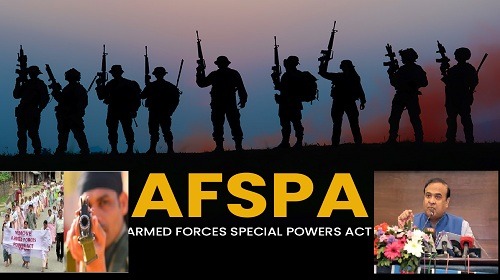
View On WordPress
#AFSPA#Assam#Assam Chief Minister#Assam Police battalions#Breaking +65News Near Me#Breaking News#breaking news app#breaking news headlines#breaking news india#breaking news now#CAPF#Central Armed Police Force#CM Himanta Biswa#Controversial law#Exclusive News#india breaking news#International Breaking News#local headlines today#remove AFSPA#Today Breaking News#Trending News
0 notes
Photo
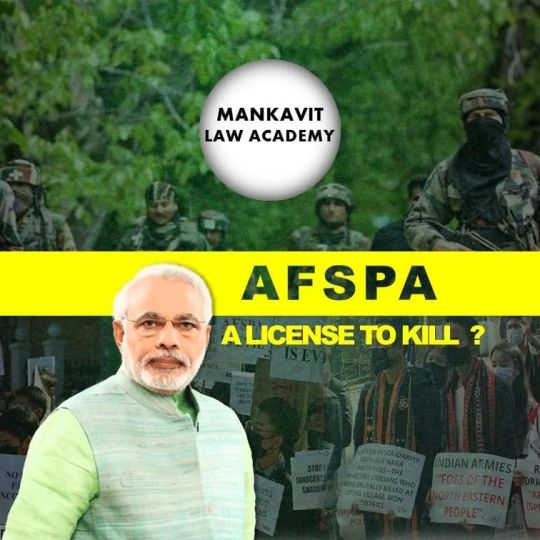
What happens when saviour becomes the destroyer ? -Malom Massacre, 10 killed -1994 Fake Assam encounter, 9 killed -Sophian Fake Encounter, 3 killed - Nagaland Mon Encounters, 14 killed. & countless other instances. Legal sanction to Fake encounters on the pretext of protection ? Comment your views below. . . . . . #afspa #northeast #northeastindia #india #law #lawstudent #legalknowledge #army #specialpowers #specialpower #centralgovetment #encounter #sevensisters #supremecourtofindia #constitution #constitutionality #legalknowhow #llmentrance #clatpg2023 #clatpg2023preparation #onlinecoaching #onlinecoachingforllm #coachingforllmentrance #coachingforllm #ailetpg2023 #mankavitlawacademy #llmentrance #llmonlinecoaching #llmonline https://www.instagram.com/p/CiHtBIjpgWS/?igshid=NGJjMDIxMWI=
#afspa#northeast#northeastindia#india#law#lawstudent#legalknowledge#army#specialpowers#specialpower#centralgovetment#encounter#sevensisters#supremecourtofindia#constitution#constitutionality#legalknowhow#llmentrance#clatpg2023#clatpg2023preparation#onlinecoaching#onlinecoachingforllm#coachingforllmentrance#coachingforllm#ailetpg2023#mankavitlawacademy#llmonlinecoaching#llmonline
1 note
·
View note
Text
AFSPA: Repeal Won't Change Anything
AFSPA: Repeal Won’t Change Anything
AAKAR PATEL The army has been left to do justice to itself for crimes it is accused of committing against civilians. As a force inside the government, obviously it will want that there be no intrusion into what they do, asserts Aakar Patel. The killing of 14 Indians by the army in Nagaland has resurrected the demand for the repeal of AFSPA, the Armed Forces Special Powers Act. Two North East…
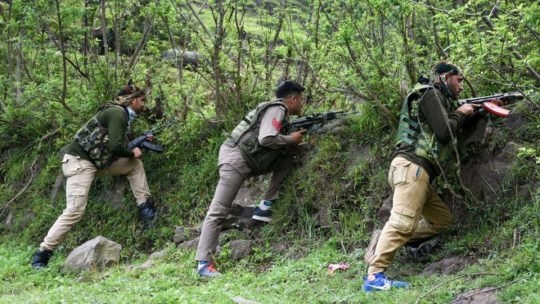
View On WordPress
0 notes
Note
I saw your post about CAB. Before you go accusing Assam of being xenophobic, please try to understand the situation in the NE. There are a lot of indigenous minority groups here, and none of the NE states want another Tripura-like situation. While there are reservations and ILP for protection of the natives, what about natives who are Gen, not SC/ST? They don’t have any laws for protection of their interests. Moreover, we do not have the resources to sustain such a large influx as expected.
This is my answer is for the large number of people who have asked me to "understand why Assam is different," or to visit the northeast or to not use loaded terms like xenophobia in connection with what's going on in Assam.
Look, I respect and understand your concern. I get it that your states are burdened with undocumented migrants, and that this causes problems for your indigenous populations; especially as resources are already limited. However, I urge you look at who you are throwing under the bus and what it's going to mean for them. These undocumented migrants are more often than not poor, marginalized people who have no papers, no proper identification, and no homes to return to in their country of origin. Many of them are also lower caste and belong to a persecuted minority in their country of origin. Secondly, nobody is talking about welcoming more people into the country (although we should think about that also and have a proper ministry for refugee and migrant affairs but that's a separate topic.)
We are worried about the people who are here already.
All we are saying is that they deserve a place of dignity and safety. Or would you rather see them all in detention camps? Or do you want them thrown into the sea?
Your grounds for opposition to the CAA are morally flawed. While the rest of the country is protesting against it because it seeks to disenfranchize Muslims, you are protesting because you don't want to see any undocumented migrant legalized. Do you see the difference?
The correct position to take, would be to insist that citizenship be granted to all undocumented migrants but also that their resettlement become the shared responsibility of multiple states across the country. This would protect the northeast from the demographic change that threatens the wellbeing of indigenous communities without destroying the lives of millions of migrants.
This is my final say on this subject. You can scream yourself hoarse to disagree with me. But if you seek the death, detention, or deportation of people who are already in the country and have been here for decades, then there is a problem with you. I am indeed a privileged Indian. But my grandparents migrated to India during the partition. I know their pain. Pardon me for not wanting others to go through it. Someone on my previous post commented that the govt. has neglected and mistreated the northeast with the use of AFSPA. I fully agree with you there. AFSPA is a draconian law that doesn't belong in any civilized society. That is a fight against the govt. that all of us need to fight. But again, it isn't connected to the uncertainty which colors the lives of undocumented migrants. Both these issues deserve our full empathy and should not be used against each other.
As a Sikh woman whose family lived through the reign of terror in Punjab, I know what repression looks like.
I may sound insensitive to the plight of the northeast. But I think you are not listening to me.
2 notes
·
View notes
Text
Jammu & Kashmir: Why Mehbooba Mufti is pulling out all stops against BJP-led Centre
NEW DELHI: Much before the amendment to Article 370 in Jammu and Kashmir, PDP chief Mehbooba Mufti had started building up a front against the BJP-led Centre, warning it of the consequences if they fiddled with the special status of the erstwhile state. Daughter of Peoples Democratic Party (PDP) founder Mufti Mohammed Sayeed, Mehbooba Mufti (60) became J&K’s first woman chief minister in 2016 after her father, who was CM at that time, died after a brief illness. From taking her father’s alliance with the BJP in 2015 further to its break-up in 2018, we take a look at what went wrong that Mehbooba Mufti has been merciless in her attack on the BJP. Failed BJP-PDP alliance In March 2015, the BJP-PDP came together to take the reins of Jammu and Kashmir with Mufti Mohammad Sayeed as the chief minister. It was the first time an alliance was formed between the PDP and the BJP. Mufti Sayeed had called the PDP-BJP coalition an alliance of north pole and south pole that don’t meet in normal circumstances. But with the death of the PDP founder in July 2016, the coalition future was in disarray given Mehbooba Mufti’s reluctance.

After deliberations over months, Mehbooba Mufti finally took forward her father’s decision of allying with the BJP in J&K, surprising and upsetting many at the same time in the erstwhile state, especially in the Valley. But differences on a host of issues had started cropping in. However, in June 2018, the BJP pulled out of the alliance, leaving the PDP embarrassed and shocked, eventually leading to the fall of the coalition government. Since then both the parties have been at each other’s throats. From Article 370 to AFSPA, Kathua minor rape to ceasefire issue with Pakistan, the two parties have hardly seen eye to eye lately. Cobbling up Third Front To nudge the BJP that was trying to cobble up an alliance with Sajad Lone’s People’s Conference in J&K and few disgruntled PDP leaders, the PDP, NC and Congress threw up a surprise in November 2018 by announcing the formation of a coalition to form government in the erstwhile state. The PDP had 28 MLAs, followed by NC with 15 and Congress with 12 which would have taken the alliance well above the majority mark of 44. However, that attempt was throttled by many hiccups, the most important being the role of the then J&K Governor Satya Pal Malik. What followed was the dissolution of the J&K legislative assembly by Malik, just after the PDP, NC and Congress had announced that they would stake claims to form a government. Malik’s move put an end to any such possibility, leading to further bitter relations between the J&K parties and the BJP. Also, the PDP holds the BJP responsible for many of its senior leaders breaking ties with the party. Talking about PDP’s rift with the BJP, a party leader said that the saffron party “betrayed” them even though there was a set agenda for six plans in which PM Modi was directly involved. “Not only did they leave the state in a limbo, the BJP also tried to break up regional parties here,” the leader said who did not want to be named. Amendment to Article 370 Even before Article 370 was amended, Mehbooba Mufti had warned the Centre against the proposal, saying it would be akin to playing with fire and would end J&K’s relation with India. Sensing that the BJP government was up to something, the NC, PDP, PC and the Congress held an all-party meet on August 4, 2019, at Farooq Abdullah’s residence pledging to defend the special status of Jammu and Kashmir. But the BJP government went ahead and removed the special status of Jammu & Kashmir on August 5, 2019 and bifurcated the state into two Union territories of J&K, and Ladakh. Most of the mainstream politicians, including Mehbooba Mufti, Farooq Abdullah, Omar Abdullah, Sajad Lone and others were booked under the PSA and detained. While all the politicians were released one after another by the government in a few months, Mehbooba Mufti was the last one. The PDP chief was released on October 13, over a year after she was arrested. That, of course, did not help the two parties come together. Making of People’s Alliance Days after the release of Mehbooba Mufti, mainstream political parties in Jammu and Kashmir held a meeting on October 15 and formed an alliance – ‘Peoples’ Alliance for Gupkar Declaration’ – for restoration of the special status of the erstwhile state as it existed before August 5 last year. On October 23, in her first media interaction after her release from 14-month detention, the PDP chief seemed to harden her stand while saying she was not interested in contesting elections or holding the national tricolour till the constitutional changes enforced on August 5 last year were rolled back.

In an act seen as defiance, the flag of the erstwhile state of J&K was prominently placed on a table in front of the PDP president along with the flag of the PDP during the presser. “This is my flag,” Mehbooba said, pointing to the flag of the erstwhile state, when a reporter asked her about her statement that if Article 370 was amended, there will be no one left to hold India’s flag. She added that Jammu and Kashmir’s relation with India was because of the erstwhile state’s special constitutional position which included a separate flag. Her comments were condemned strongly by the BJP who said certain Kashmir-centric politicians practice “politics of opportunism” as when they are in power they swear by India and once out of power, they question the sovereignty of the country. What exactly is at stake for Mehbooba and the PDP? The most crucial thing right now for the PDP is to survive, at any cost. From allying with the BJP to the death of its patron Mufti Sayeed, from Mehbooba Mufti’s “toffee” comment for the killed children in Kashmir to her partymen leaving her at the most vulnerable times, nothing has been going the PDP’s way since 2016. The last nail in the coffin being removal of the special status of J&K by the same BJP that the PDP allied with. So Mehbooba Mufti per se does not have many options but to go on an all-out attack at the Centre, trying to appeal to her voter base in Kashmir which is her last chance to survive, given the competition from the regional parties as well as the BJP. Allying with the BJP never went down well with the Kashmiris, particularly Muslims, who think PDP is the reason BJP came into Kashmir and then got bold enough to amend Article 370. So PDP is also blamed for bifurcation of the state by Kashmiris. During Mufti’s rule, more than 100 people sustained eye injuries from pellets due to unrest in the Valley. Among the injured were 18-month old Hiba Nissar from Shopian whose eye was ruptured by a pellet fired by security forces. Hiba is the youngest victim of the pellet guns used in Kashmir. Human rights organisations have called for complete ban on their usage but even then the J&K government under Mehbooba’s rule in September 2016 told a court that firing pellets on protesters was not unconstitutional and the court should leave it to the state “as to what method is required” to maintain law and order. This, of course, enraged Kashmiris and would prefer the NC or Congress now over the PDP. Many senior party members have left the party after the BJP pulled out of the alliance. While few, including Shia leader Imran Ansari joined Sajad Lone’s party, former education minister Altaf Bukhari founded his own party, which many believe was at the behest of the BJP. Another senior leader Haseeb Drabu, former finance minister, was sacked over his comments on Kashmir while few others were suspended for anti-party activities. Given the fact that it was the Central government in 1997-98 under Vajpayee that encouraged Mufti Sayeed to cobble up an alternative mainstream party in J&K that would encompass sections between the NC and the separatist camp. Though Mufti Sayeed was the leader at that time, it was Mehbooba Mufti’s tireless efforts that made the PDP emerge victorious in the 2003 elections against the NC. From visiting the families of militants to addressing the public anger against the NC, Mehbooba Mufti did the groundwork for the PDP. Mehbooba Mufti, who is known for her aggressive opposition and not for holding back what she feels, seems to have focussed all her criticism towards the BJP-led Centre – the party she feels betrayed her father and his agenda in J&K. Mehbooba Mufti, as a politician, understands that as long as the BJP is at the Centre there is hardly any other way but to be aggressive, otherwise her party would be crushed. Talking about the PDP strategy for its future, its youth leader Waheed-ur-Rehman Parra said that right now the fight is for “identity” and the “future” of Kashmir, which is not an electoral fight. “Individuals do not matter right now, we are willing to sacrifice everything for our identity as Kashmiris. The natives here may be rendered homeless, jobless or even landless in the near future. Fears of yesterday are the reality now. So the battle is much bigger than electoral politics,” he added. Instead of cosying up to the BJP, Mehbooba Mufti has chosen to be the north pole again and not be the “team B” of the saffron party, according to party sources. A lost voter confidence (having lost the Lok Sabha election) to leaders deserting the party to the question of its survival, the PDP has nothing much to lose given the current scenario. So why not give it all seems to be the mantra of the PDP chief as of now.
The post Jammu & Kashmir: Why Mehbooba Mufti is pulling out all stops against BJP-led Centre appeared first on BreakingNews.
source https://bbcbreakingnews.com/2020/11/09/jammu-kashmir-why-mehbooba-mufti-is-pulling-out-all-stops-against-bjp-led-centre/
0 notes